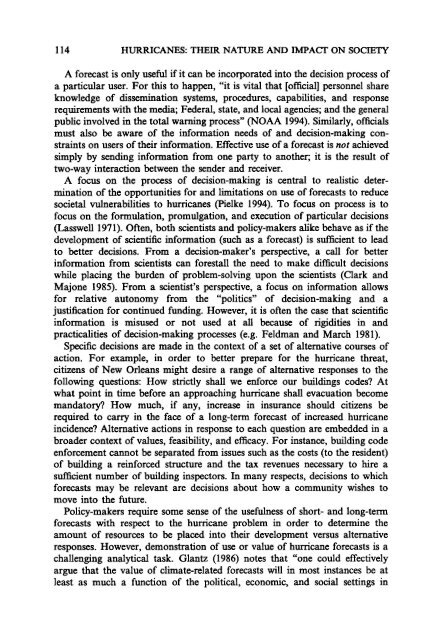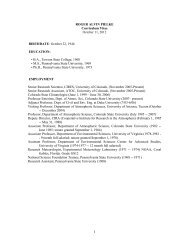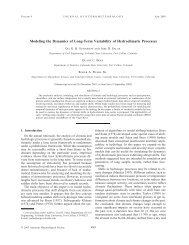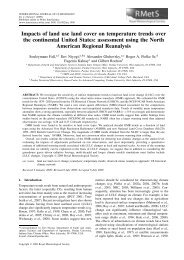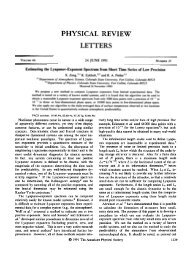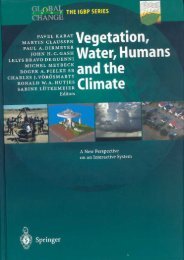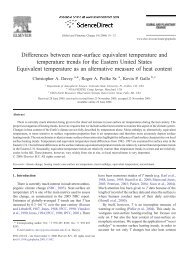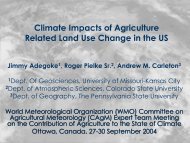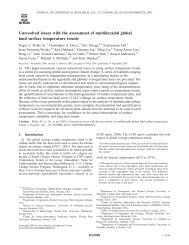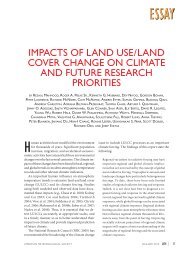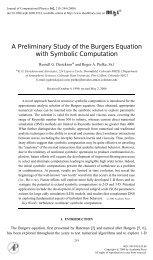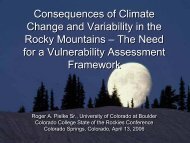Hurricanes: Their Nature and Impacts on Society - Climate Science ...
Hurricanes: Their Nature and Impacts on Society - Climate Science ...
Hurricanes: Their Nature and Impacts on Society - Climate Science ...
You also want an ePaper? Increase the reach of your titles
YUMPU automatically turns print PDFs into web optimized ePapers that Google loves.
114<br />
HURRICANES: THEIR NATURE AND IMPACT ON SOCffiTY<br />
A forecast is <strong>on</strong>ly useful if it can be incorporated into the decisi<strong>on</strong> process of<br />
a particular user. For this to happen, "it is vital that [official] pers<strong>on</strong>nel share<br />
knowledge of disseminati<strong>on</strong> systems, procedures, capabilities, <str<strong>on</strong>g>and</str<strong>on</strong>g> resp<strong>on</strong>se<br />
requirements with the media; Federal, state, <str<strong>on</strong>g>and</str<strong>on</strong>g> local agencies; <str<strong>on</strong>g>and</str<strong>on</strong>g> the general<br />
public involved in the total warning process" (NOAA 1994). Similarly, officials<br />
must also be aware of the informati<strong>on</strong> needs of <str<strong>on</strong>g>and</str<strong>on</strong>g> decisi<strong>on</strong>-making c<strong>on</strong>straints<br />
<strong>on</strong> users of their informati<strong>on</strong>. Effective use of a forecast is not achieved<br />
simply by sending informati<strong>on</strong> from <strong>on</strong>e party to another; it is the result of<br />
two-way interacti<strong>on</strong> between the sender <str<strong>on</strong>g>and</str<strong>on</strong>g> receiver.<br />
A focus <strong>on</strong> the process of decisi<strong>on</strong>-making is central to realistic determinati<strong>on</strong><br />
of the opportunities for <str<strong>on</strong>g>and</str<strong>on</strong>g> limitati<strong>on</strong>s <strong>on</strong> use of forecasts to reduce<br />
societal vulnerabilities to hurricanes (Pielke 1994). To focus <strong>on</strong> process is to<br />
focus <strong>on</strong> the formulati<strong>on</strong>, promulgati<strong>on</strong>, <str<strong>on</strong>g>and</str<strong>on</strong>g> executi<strong>on</strong> of particular decisi<strong>on</strong>s<br />
(Lasswell 1971). Often, both scientists <str<strong>on</strong>g>and</str<strong>on</strong>g> policy-makers alike behave as if the<br />
development of scientific informati<strong>on</strong> (such as a forecast) is sufficient to lead<br />
to better decisi<strong>on</strong>s. From a decisi<strong>on</strong>-maker's perspective, a call for better<br />
informati<strong>on</strong> from scientists can forestall the need to make difficult decisi<strong>on</strong>s<br />
while placing the burden of problem-solving up<strong>on</strong> the scientists (Clark <str<strong>on</strong>g>and</str<strong>on</strong>g><br />
Maj<strong>on</strong>e 1985). From a scientist's perspective, a focus <strong>on</strong> informati<strong>on</strong> allows<br />
for relative aut<strong>on</strong>omy from the "politics" of decisi<strong>on</strong>-making <str<strong>on</strong>g>and</str<strong>on</strong>g> a<br />
justificati<strong>on</strong> for c<strong>on</strong>tinued funding. However, it is often the case that scientific<br />
informati<strong>on</strong> is misused or not used at all because of rigidities in <str<strong>on</strong>g>and</str<strong>on</strong>g><br />
practicalities of decisi<strong>on</strong>-making processes (e.g. Feldman <str<strong>on</strong>g>and</str<strong>on</strong>g> March 1981).<br />
Specific decisi<strong>on</strong>s are made in the c<strong>on</strong>text of a set of alternative courses of<br />
acti<strong>on</strong>. For example, in order to better prepare for the hurricane threat,<br />
citizens of New Orleans might desire a range of alternative resp<strong>on</strong>ses to the<br />
following questi<strong>on</strong>s: How strictly shall we enforce our buildings codes? At<br />
what point in time before an approaching hurricane shall evacuati<strong>on</strong> become<br />
m<str<strong>on</strong>g>and</str<strong>on</strong>g>atory? How much, if any, increase in insurance should citizens be<br />
required to carry in the face of a l<strong>on</strong>g-term forecast of increased hurricane<br />
incidence? Alternative acti<strong>on</strong>s in resp<strong>on</strong>se to each questi<strong>on</strong> are embedded in a<br />
broader c<strong>on</strong>text of values, feasibility, <str<strong>on</strong>g>and</str<strong>on</strong>g> efficacy. For instance, building code<br />
enforcement cannot be separated from issues such as the costs (to the resident)<br />
of building a reinforced structure <str<strong>on</strong>g>and</str<strong>on</strong>g> the tax revenues necessary to hire a<br />
sufficient number of building inspectors. In many respects, decisi<strong>on</strong>s to which<br />
forecasts may be relevant are decisi<strong>on</strong>s about how a community wishes to<br />
move into the future.<br />
Policy-makers require some sense of the usefulness of short- <str<strong>on</strong>g>and</str<strong>on</strong>g> l<strong>on</strong>g-term<br />
forecasts with respect to the hurricane problem in order to determine the<br />
amount of resources to be placed into their development versus alternative<br />
resp<strong>on</strong>ses. However, dem<strong>on</strong>strati<strong>on</strong> of use or value of hurricane forecasts is a<br />
challenging analytical task. Glantz (1986) notes that "<strong>on</strong>e could effectively<br />
argue that the value of climate-related forecasts will in most instances be at<br />
least as much a functi<strong>on</strong> of the political, ec<strong>on</strong>omic, <str<strong>on</strong>g>and</str<strong>on</strong>g> social settings in


